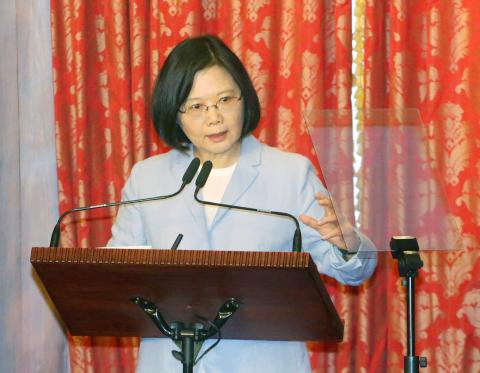President Tsai Ing-wen (蔡英文) yesterday reiterated the importance of dialogue in cross-strait relations and regional stability, pledging to continue the government’s efforts to maintain stable ties with Beijing.
“With regard to cross-strait ties, I must stress once again the importance of maintaining the status quo. Our goal is to establish ties with Beijing that are consistent, predictable and sustainable under the current constitutional system,” Tsai said during a tea gathering with the media in Taipei.
She said that despite China’s continued suspension of official cross-strait communication mechanisms, there have still been different levels of interactions between both sides of the Taiwan Strait.

Photo: CNA
Expressing hope that both sides would have suggestions on how to engage in dialogue after their relations become stabilized, Tsai said it requires a joint effort from both Taipei and Beijing and that it is a shared responsibility.
“In my inauguration speech on May 20, I did my utmost to close the gap between our stances. I have also endeavored to maintain the stability of cross-strait ties in the past three months,” she said.
Beijing has halted exchanges with Taipei due to Tsai’s refusal to officially recognize the so-called “1992 consensus,” which refers to an alleged understanding between the Chinese Nationalist Party (KMT) and the Chinese government that both sides of the Taiwan Strait acknowledge there is “one China,” with each side having its own interpretation of what “China” means.
Tsai said her attitude toward cross-strait ties and regional stability has been consistent and involves avoiding misunderstandings and supporting continuous communication with concerned nations.
Civic and semi-official interactions are also encouraged, Tsai said, adding that she has adopted the same attitude toward other countries in the region.
As for the pending appointment of a new Straits Exchange Foundation chairman, Tsai said her administration is still in the process of gauging the willingness of people on the short list to assume the post and that a final decision is to be made in the near future.
Asked to elaborate on the requirements for the head of the foundation, Tsai said it should be someone respected and trusted by the public.
Responding to a reporter’s question on the territorial disputes in the South China Sea, Tsai said the government has endeavored to maintain stability in the region following the ruling by the Permanent Court of Arbitration in The Hague, the Netherlands, on July 12.
“We understand that people want to see more action from the government on the South China Sea issue,” Tsai said.
However, she declined to respond directly to questions as to whether she plans to personally visit Itu Aba Island (Taiping Island, 太平島), the largest island in the Spratly Islands (Nansha Islands, 南沙群島), which has been administered by Taiwan since 1956.
Itu Aba was categorized as legally a “rock” instead of an “island” by the tribunal, prompting calls for the Tsai administration to take action to safeguard the nation’s sovereignty over the feature.

The CIA has a message for Chinese government officials worried about their place in Chinese President Xi Jinping’s (習近平) government: Come work with us. The agency released two Mandarin-language videos on social media on Thursday inviting disgruntled officials to contact the CIA. The recruitment videos posted on YouTube and X racked up more than 5 million views combined in their first day. The outreach comes as CIA Director John Ratcliffe has vowed to boost the agency’s use of intelligence from human sources and its focus on China, which has recently targeted US officials with its own espionage operations. The videos are “aimed at

STEADFAST FRIEND: The bills encourage increased Taiwan-US engagement and address China’s distortion of UN Resolution 2758 to isolate Taiwan internationally The Presidential Office yesterday thanked the US House of Representatives for unanimously passing two Taiwan-related bills highlighting its solid support for Taiwan’s democracy and global participation, and for deepening bilateral relations. One of the bills, the Taiwan Assurance Implementation Act, requires the US Department of State to periodically review its guidelines for engagement with Taiwan, and report to the US Congress on the guidelines and plans to lift self-imposed limitations on US-Taiwan engagement. The other bill is the Taiwan International Solidarity Act, which clarifies that UN Resolution 2758 does not address the issue of the representation of Taiwan or its people in

US Indo-Pacific Commander Admiral Samuel Paparo on Friday expressed concern over the rate at which China is diversifying its military exercises, the Financial Times (FT) reported on Saturday. “The rates of change on the depth and breadth of their exercises is the one non-linear effect that I’ve seen in the last year that wakes me up at night or keeps me up at night,” Paparo was quoted by FT as saying while attending the annual Sedona Forum at the McCain Institute in Arizona. Paparo also expressed concern over the speed with which China was expanding its military. While the US

SHIFT: Taiwan’s better-than-expected first-quarter GDP and signs of weakness in the US have driven global capital back to emerging markets, the central bank head said The central bank yesterday blamed market speculation for the steep rise in the local currency, and urged exporters and financial institutions to stay calm and stop panic sell-offs to avoid hurting their own profitability. The nation’s top monetary policymaker said that it would step in, if necessary, to maintain order and stability in the foreign exchange market. The remarks came as the NT dollar yesterday closed up NT$0.919 to NT$30.145 against the US dollar in Taipei trading, after rising as high as NT$29.59 in intraday trading. The local currency has surged 5.85 percent against the greenback over the past two sessions, central